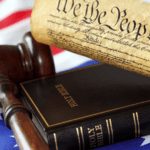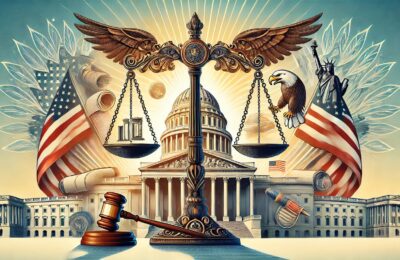This is Part 8 of the series Why Religious Liberty Matters
Faith Under Pressure:
Religious Liberty in the Face of Cultural and Ideological Change
Religious liberty is at a critical juncture in American culture, as rapid societal changes press against traditional biblical beliefs. Today, competing ideologies, such as Critical Theory and expressive individualism, challenge the foundations of religious freedom by redefining truth and reshaping the boundaries of personal and public morality. As society increasingly values subjective interpretations of truth and identity, Christians face the dual challenge of upholding the objective truth of the gospel while living peacefully in a pluralistic culture.
Romans 12:2 reminds believers, “Do not be conformed to this world, but be transformed by the renewing of your mind, so that you may prove what the will of God is” (Legacy Standard Bible, 2021). This charge is more relevant than ever as believers seek to navigate the cultural waters of expressive individualism, a concept Carl Trueman explores in his book The Rise and Triumph of the Modern Self. Trueman explains how the modern self is shaped by a worldview that prizes self-expression above external truths, a perspective that sits in tension with a biblical understanding of identity as created by and accountable to God. This post examines current cases, the influence of Critical Theory, the pressures of expressive individualism, and where religious liberty may be headed in an increasingly pluralistic society.
Current Cases and Debates
One of the most significant recent cases affecting religious liberty is Fulton v. City of Philadelphia (2021). In this case, the Supreme Court ruled in favor of a Catholic foster care agency that refused to certify same-sex couples as foster parents due to religious beliefs. Philadelphia’s policy required the agency to either comply with the city’s non-discrimination mandate or lose its contract, which the agency argued infringed upon its First Amendment rights. The Supreme Court ruled that Philadelphia had violated the agency’s right to free exercise of religion by refusing to renew its contract (U.S. Supreme Court, 2021). This case underscores the ongoing tension between anti-discrimination policies and religious convictions, highlighting the challenge of upholding biblical beliefs within an increasingly secular legal landscape.
The influence of Critical Theory in contemporary debates complicates matters further by shifting the basis of truth and justice from objective standards to group identity and perceived oppression. Rooted in Marxist thought, Critical Theory views societal power structures as inherently oppressive, dividing individuals into categories of oppressors and the oppressed. For Christians, the challenge is that biblical truths—such as the inherent dignity of every person as an image-bearer of God (Genesis 1:27)—are often disregarded in favor of relativistic frameworks that see truth as fluid, dependent on individual experience and group affiliation. This has direct implications for religious liberty, as it pressures believers and faith-based organizations to conform to prevailing social norms rather than objective truths grounded in Scripture.
In this cultural climate, Carl Trueman’s insights on expressive individualism become highly relevant. Trueman argues that modern society increasingly prioritizes self-expression and self-identity over external moral standards. This philosophy values an individual’s “authentic” self as the highest authority, often in opposition to biblical teachings on submission to God’s design. When combined with Critical Theory, expressive individualism drives a redefinition of religious freedom as a private, internal matter, rather than an outward, transformative commitment that shapes all of life. This trend places pressure on believers to keep their faith within personal boundaries, challenging the biblical mandate to “shine as lights in the world” (Philippians 2:15, Legacy Standard Bible, 2021) and to live out faith in public spaces.
Religious Liberty in Health Care and Education
In the fields of health care and education, the impact of Critical Theory and expressive individualism is particularly pronounced. Faith-based health care providers, for instance, are increasingly pressured to perform or refer for procedures, such as abortion and gender reassignment surgeries, that conflict with biblical beliefs about the sanctity of life and the created order. These issues are no longer just medical but deeply ideological, as institutions are expected to align with prevailing social narratives that affirm expressive individualism. For Christian providers, honoring the sanctity of life and God’s design for humanity is foundational, as seen in Psalm 139:13-14, which declares, “For You formed my inward parts; You wove me in my mother’s womb. I will give thanks to You, for I am fearfully and wonderfully made” (Legacy Standard Bible, 2021).
Similarly, religious schools face increasing legal and cultural pressure to adopt curricula and hiring practices that align with secular beliefs about identity and sexuality. Cases like Our Lady of Guadalupe School v. Morrissey-Berru (2020) have defended religious institutions’ right to hire according to their faith, invoking the “ministerial exception” to protect these schools’ missions. However, as society grows more pluralistic, faith-based schools may find themselves increasingly targeted by anti-discrimination laws that disregard their biblical convictions. The command in Deuteronomy 6:6-7 to “teach [God’s words] diligently to your children” (Legacy Standard Bible, 2021) is a driving force behind Christian education, yet this biblical mandate is now being challenged by cultural ideologies that seek to redefine fundamental truths about human identity.
For believers in health care and education, these challenges underscore the importance of standing firm in biblical convictions while seeking to engage the culture with grace and truth, trusting God to guide and protect those who are faithful to His word.
Predictions for the Future
Given the influence of Critical Theory and expressive individualism, religious liberty will likely face ongoing challenges in an increasingly pluralistic society. Several potential developments include:
Further Legal Clarity on Religious Exemptions: As religious freedom cases continue to appear before the Supreme Court, we may see clearer guidelines on the extent to which religious exemptions apply in areas like health care, education, and public accommodations. Christians must be prepared to navigate these guidelines in a way that balances adherence to biblical principles with love and respect for others, embodying the spirit of Philippians 1:27, “conduct yourselves in a manner worthy of the gospel of Christ” (Legacy Standard Bible, 2021).
Increased State-Level Legislation for Religious Freedom: Some states are likely to strengthen protections for religious liberty, providing alternatives where federal protections fall short. State-level Religious Freedom Restoration Acts (RFRAs) and conscience protections for faith-based institutions may become essential for believers navigating secular policies. This local advocacy for religious liberty is an example of living faithfully in one’s community, as seen in Jeremiah 29:7, where God instructs the exiled Israelites to “seek the welfare of the city where I have sent you” (Legacy Standard Bible, 2021).
Challenges in Public Education: Education remains a key area where expressive individualism and Critical Theory are shaping curricula and policies. As schools increasingly promote secular ideologies that contradict biblical values, Christian parents and educators may turn to alternative educational options or advocate for curriculum policies that respect diverse beliefs. Proverbs 22:6’s command to “train up a child in the way he should go” (Legacy Standard Bible, 2021) calls Christians to guide children in truth, even as cultural pressures intensify.
Unity Amid Diversity: As pluralism continues to shape the American landscape, fostering a respectful culture that values differing beliefs while safeguarding core rights will be crucial. Christians are called to serve as “ambassadors for Christ” (2 Corinthians 5:20), representing His love and truth in a way that speaks to people from all walks of life. Building relationships and witnessing to God’s truth in love will be essential as believers navigate a world that increasingly values self-defined truth over objective biblical principles.
These predictions highlight that religious liberty will remain a dynamic area of American law, requiring Christians to remain grounded in Scripture, aware of cultural trends, and prepared to engage with conviction and compassion.
Reflective Questions
As we consider the future of religious liberty in light of these cultural and ideological shifts, reflect on these questions:
- How do cases like Fulton v. City of Philadelphia help you understand religious liberty’s role in a pluralistic society?
- What role should Christians play in advocating for religious liberty in health care and education, especially as secular beliefs reshape these fields?
- How can believers uphold biblical truth while respecting others’ rights in a culture increasingly shaped by Critical Theory and expressive individualism?
These questions prompt believers to think deeply about living out faith in a way that honors both God and the dignity of those around us.
Conclusion
As society continues to evolve, religious liberty faces both challenges and opportunities. Competing ideologies like Critical Theory and expressive individualism redefine what is considered true and good, often in ways that conflict with biblical principles. For believers, the call is to remain rooted in Christ, upholding God’s truth while engaging the world with compassion and respect. Cases like Fulton and issues in health care and education illustrate the importance of standing firm in biblical convictions, trusting that God’s truth endures even as cultural norms shift.
Looking to the future, Christians are called to be salt and light, living in a manner worthy of the gospel and witnessing to God’s love and truth in every sphere of life. As Jesus said in Matthew 5:16, “Let your light shine before men in such a way that they may see your good works, and glorify your Father who is in heaven” (Legacy Standard Bible, 2021). Religious liberty is not merely a legal right but a profound responsibility to live out faith in ways that bring glory to God and point others toward His eternal truth.
Chris Reighley is a Colson Fellow and a leader grounded in faith, family, and mission. With a career spanning servant leadership, digital marketing, and servant leadership, he is driven by a passion for empowering others. He is pursuing an Executive Master’s at The Bush School of Government and Public Service at Texas A&M and a Master of Arts in Biblical Studies from Redemption Seminary. Through Shoe Leather Gospel, Chris is dedicated to combating biblical illiteracy and mentoring future leaders.

References
- Legacy Standard Bible. (2021). 2nd ed.
- Trueman, C. (2020). The Rise and Triumph of the Modern Self: Cultural Amnesia, Expressive Individualism, and the Road to Sexual Revolution. Crossway.
- U.S. Supreme Court. (2020). Our Lady of Guadalupe School v. Morrissey-Berru, 591 U.S.
- U.S. Supreme Court. (2021). Fulton v. City of Philadelphia,




